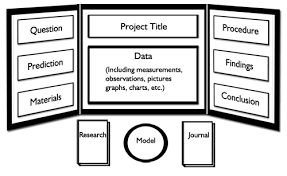|
Science Fair Packet Parent Information
|

pintrest.com
|
 pintrest.com |
|
For parents and guardians: The Science Fair can be a rewarding experience for you and your child or it can be a time of stress, panic, and misery. A lot has to do with the approach of being a mentor for your childís vision of their project. As adults, we have different skill sets that we could apply to a childís chosen project. Too much guidance can take away the empowering feeling a child gets from doing his or her own work. In the end, most kids will forget if they won or lost but they will treasure the time spent with you as a trusted guide and the feeling of accomplishment. What are some ways to make the Science Fair run smoothly? Sit down with your child and mark the calendar with the due dates. Assist your child about possible topics, ideas, experiments, or research projects. Using pre-existing experiments is perfectly fine, in fact, recommended. Your child will gather his or her data from their own experimentation/research making it personal. Look over our Science Fair page for links and take books out from the library. Former students have donated reports; they can be used to spark ideas. In class, there is a notebook of suggestions from this year and previous years filled with suggestions. Talk about some ideas your child has for a project. Goals should be realistic. The simplest projects are the best; one your child can carry out with little or no assistance and one that is completely understandable for your child will be most successful. Discuss with your child the pros and cons of working with a partner. Some positives include enjoying the experience with a friend, discovering things together, and motivating each other to do their best. Families must be prepared to coordinate schedules to make time for students to work together. The negatives of a partnership often outweigh the positives. Finding time between two busy schedules can be problematic. Differences of opinion about the project often happen and can cause tension. Sometimes one partner will not do their equal share, leaving their partner with the majority of the workload. In the past, many wonderful friendships have been strained because of the Science Fair. If you arenít sure it will work, then donít work with a partner. The best advice always is to work alone. Once the project is selected, decide what materials are needed (if any) to do an experiment or build a model. If the project is research based think about the resources that could be used. Make sure the student is keeping track of resources they intend to use be it a book, Internet site, building kit, or a personal interview, or site visit. A form to document this information is included in this package. Keep track of the dates and times the resources were used. Get started, donít wait too long. If problems are encountered along the way projects can be revised, rethought, or changed completely. Review progress periodically. Ask questions; give advice, rather than answers and solutions. Try not build or design things, or research for your child. Take note that Spring Vacation is April 17-21. Science Fair is the second Friday after we return. During the week of Science Fair is Math MCAS. Students need rest and relaxation to do their best on the test. Encourage your child to complete or nearly complete their project before April vacation, this way your family can breathe a sigh of relief knowing it is done! What is being ďgradedĒ? The only part that is graded is the report. It should be presented exactly as written in the guidelines. The project is not graded based on what was chosen for a topic. I am looking at the methodology the students used to complete their project. I do not grade the project that is presented to the PMLP judges or presentation board. The three learning goals for the students are: Follow the Scientific Method as a framework for the project and use Science Process Skills for discovery. 2. Set goals to meet project deadlines. 3. Have fun discovering something new! An important part of this project is learning to meet the due dates for each step of the process. The timeline will be adhered to and points will be subtracted for due dates not met. This project is assigned well in advance, and other than catastrophic events no excuses will be accepted. |